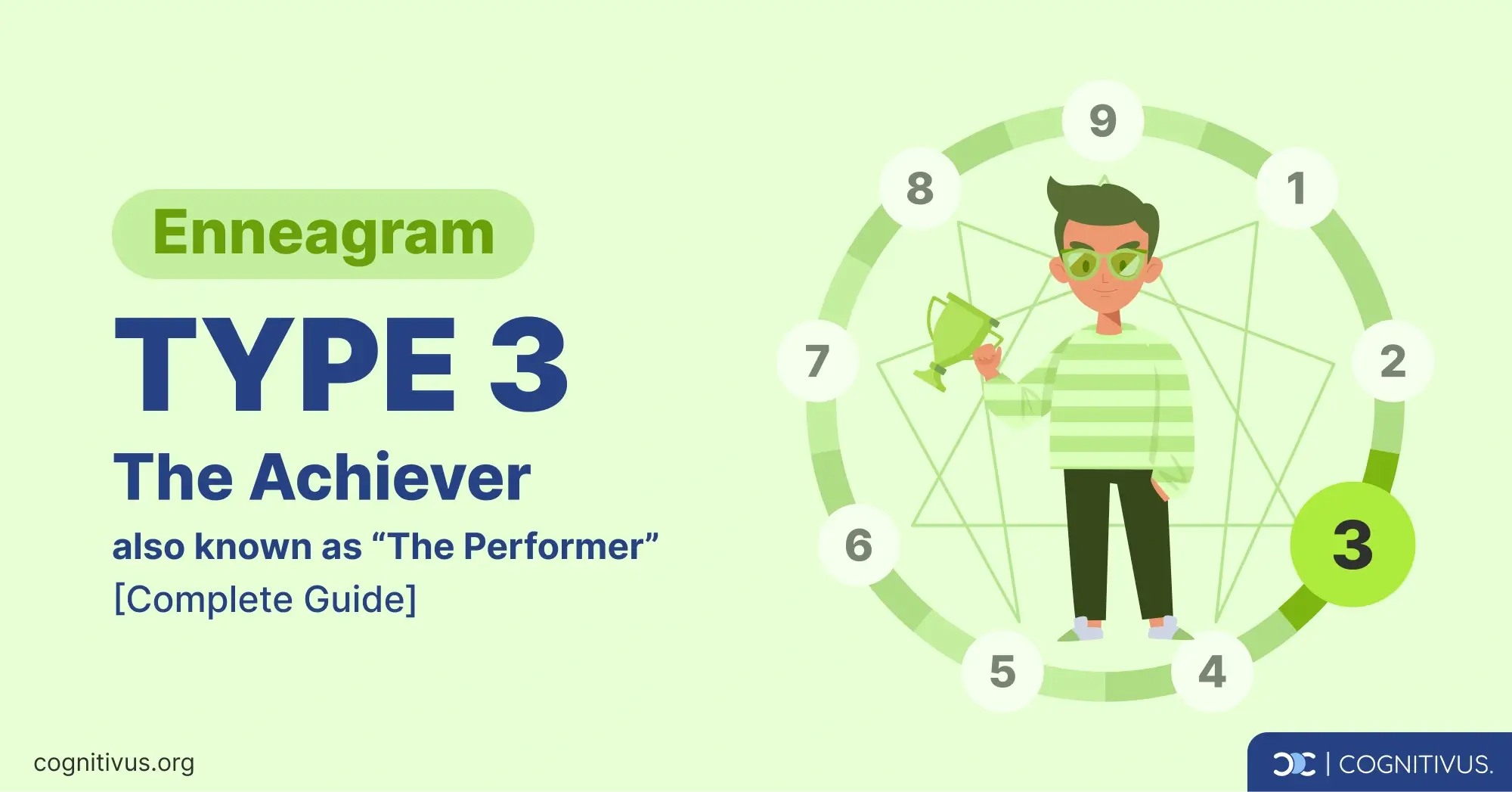Welcome to the complete guide on Enneagram Type 3: The Achiever. In this guide, we will dive into the unique traits, strengths and weaknesses of Type Threes (the « 3s »). We’ll look at how they handle their relationships (both in the workplace and their personal lives) and explore some practical tips for growth and self-improvement.
If you identify as Type Three and want to better understand yourself, or you would like to learn about and connect with the Threes in your life, then this guide is for you!
1. Enneagram Type 3 Description
Key characteristics of type threes
Enneagram Type 3s, also called The Achiever or The Performer, are all about success, adaptability, and pragmatism.
They are driven by a need for achievement and recognition. Threes are motivated by goals, and they excel in diverse environments due to their ability to adjust to various situations and people. They strive for excellence and are often seen as ambitious and hardworking. With their natural charm and charisma, Threes are able to easily inspire and influence others, making them natural leaders and effective team members.
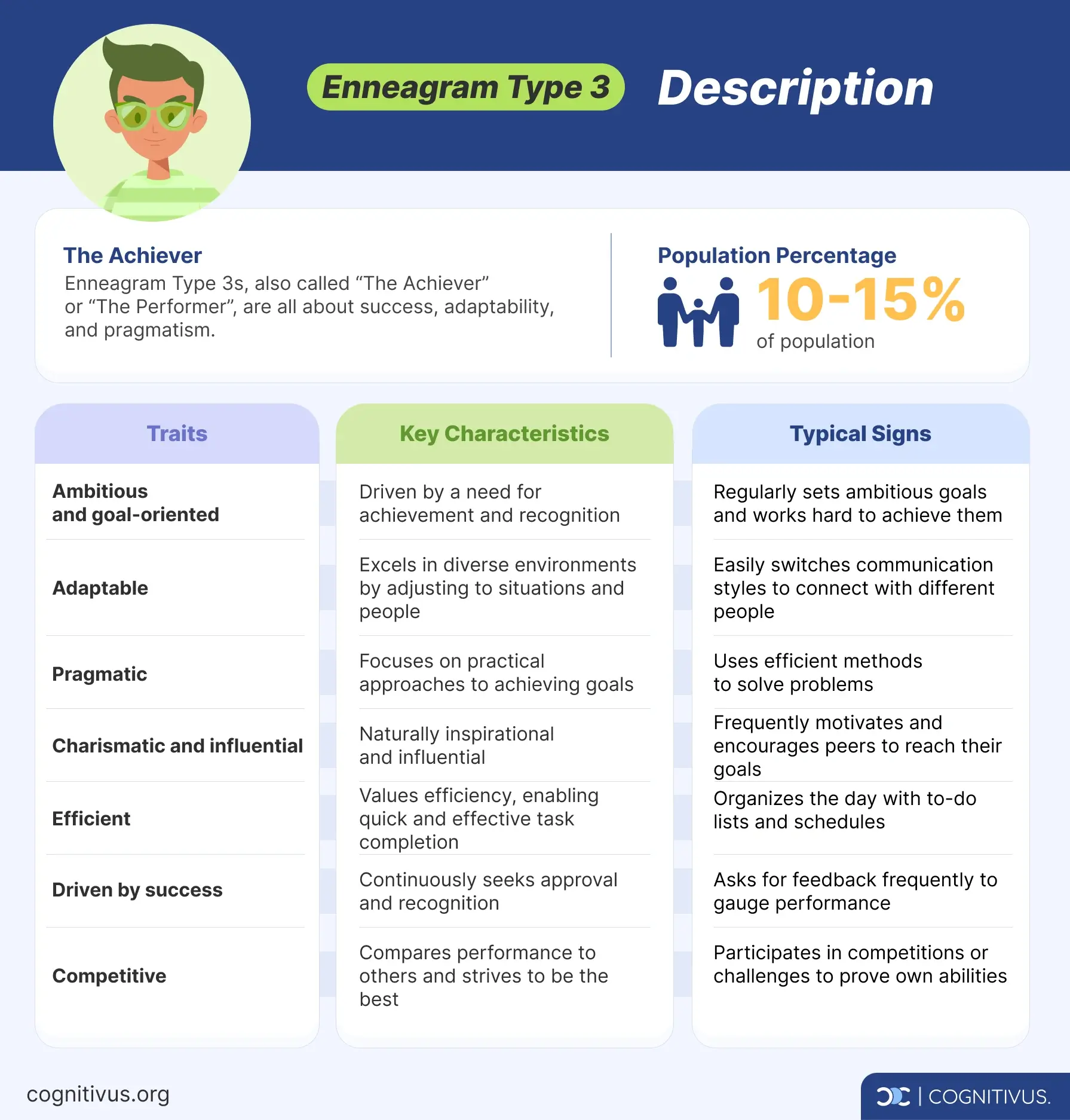
How to recognize a type 3
If you are an Enneagram Type 3, you’ll probably show one or more of these signs:
- Goal-oriented: You set ambitious goals and work hard to achieve them. For example, you might aim to become the top sales rep in your company, putting in long hours to close deals and exceed targets. You often excel in your endeavours, frequently earning promotions or accolades.
- Adaptable: You can easily adjust your behaviour and presentation to suit different situations and people. You might be serious and all business in a corporate meeting, then switch to a more relaxed and friendly vibe at a social event, making everyone feel comfortable and engaged.
- Image-conscious: You’re very aware of how others perceive you and often strive to maintain a polished, successful image. You might spend considerable time curating your social media profiles to highlight your achievements and lifestyle, always making sure you come across as competent and successful.
- Efficient: You prioritise speed and productivity, frequently figuring out the quickest and most efficient ways to complete jobs. To streamline your workflow and effectively manage several obligations, you may, for example, use a variety of productivity tools and apps, allowing you to even complete projects ahead of schedule.
- Driven by success: You continuously look for other people for approval and recognition, since your self-worth is strongly related to your accomplishments. This might show up as a desire for praise from superiors and colleagues for the hard work you've done.
- Competitive: You may compare yourself to others a lot and have a strong desire to be the best in the room. If you are working in a group, you may find yourself comparing your performance to that of your coworkers, in an effort to outperform and surpass them.
How rare is type three?
Enneagram Type 3s make up about 10-15% of the population. This relatively common type is seen in a variety of areas, including business and entertainment, where their drive and charisma can shine.
Despite their prevalence, each Type 3's manifestation of these traits can be unique. They share a common thread of ambition and adaptability, distinguishing them as top performers and high achievers. Understanding this type can help you appreciate their unwavering pursuit of success and the difficulties they frequently face to maintain their image and performance.
2. Emotional Traits of Type Three
A heart-driven type
Enneagram Type 3s are heart-driven individuals; if you are a Type 3, you thrive on emotional connections and seek validation through your achievements. As well as this, your emotions are strongly linked to your successes and the recognition your receive. This connection to your heart drives your passion and dedication to your goals.
However, this can also mean that your self-worth may fluctuate and change in response to your perceived successes and failures.
Type 3s frequently try to control their feelings in order to preserve their reputation, but deep down, still crave affirmation and appreciation.
Core fear
As a Type 3, your biggest fear is being worthless or seen as a failure. The thought of being unsuccessful or not meeting the high standards you set for yourself is something you dread deeply. It is this that can push you to work even harder and strive for so-called ‘perfection’, always aiming to prove your worth.
Core desire
Your core desire is to feel valuable and worthwhile. You seek affirmation through achievements and recognition, wanting to be admired and respected for your success.
The combination of your core fear and your core desire drive and shape much of your behaviour, influencing your goals, relationships, and overall approach to life. Understanding these core motivations is key in helping you navigate your journey with yourself, and can help bring you more self-awareness and balance.
Main strengths and weaknesses
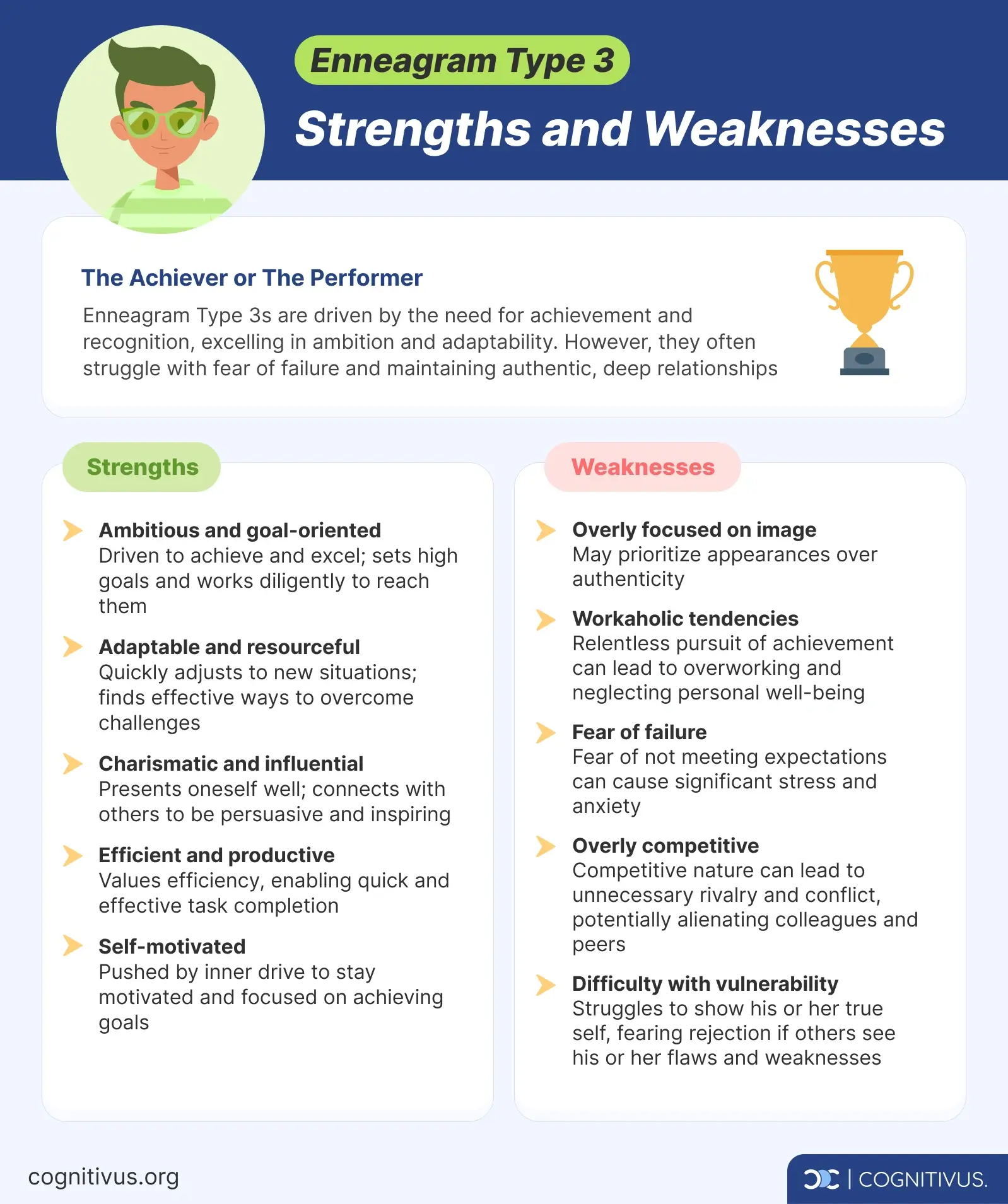
Key strengths of type 3s
- Ambitious and goal-oriented: Driven by a desire to achieve and excel, you set high goals and work diligently to accomplish them.
- Adaptable and resourceful: You have a knack for quickly adjusting to new situations and finding effective ways to overcome challenges.
- Charismatic and influential: Your ability to present yourself well and connect with others makes you persuasive and inspiring.
- Efficient and productive: Due to valuing efficiency, you are often able to accomplish tasks quickly and effectively.
- Self-motivated: Your inner drive pushes you to stay motivated and focused, constantly striving to achieve your goals.
Key weaknesses of type three
- Overly focused on image: Sometimes, your need to be seen as successful can lead you to prioritise appearances over authenticity.
- Workaholic tendencies: Your relentless pursuit of achievement can lead to working too much, at the expense of your personal well-being.
- Fear of failure: The thought and fear of not meeting expectations, whether that’s your own or others, can cause significant stress and anxiety.
- Superficial relationships: Your focus on success might sometimes lead to relationships that lack depth, as you may prioritise networking over deeper and more enduring connections.
- Difficulty with vulnerability: You may struggle to show your true self, fearing that others will not accept you if they see your flaws and weaknesses.
3. Enneagram Type 3 Wings Explained
In the Enneagram system, nobody has one pure personality type; instead, each has a special combination of their main, fundamental type and characteristics of one of the two adjacent types, known as the Enneagram wings. For Type 3, these wings are 2 and 4. While your overall personality is dominated by your main type, your wing adds nuances to your personality, influencing how you express your core type.
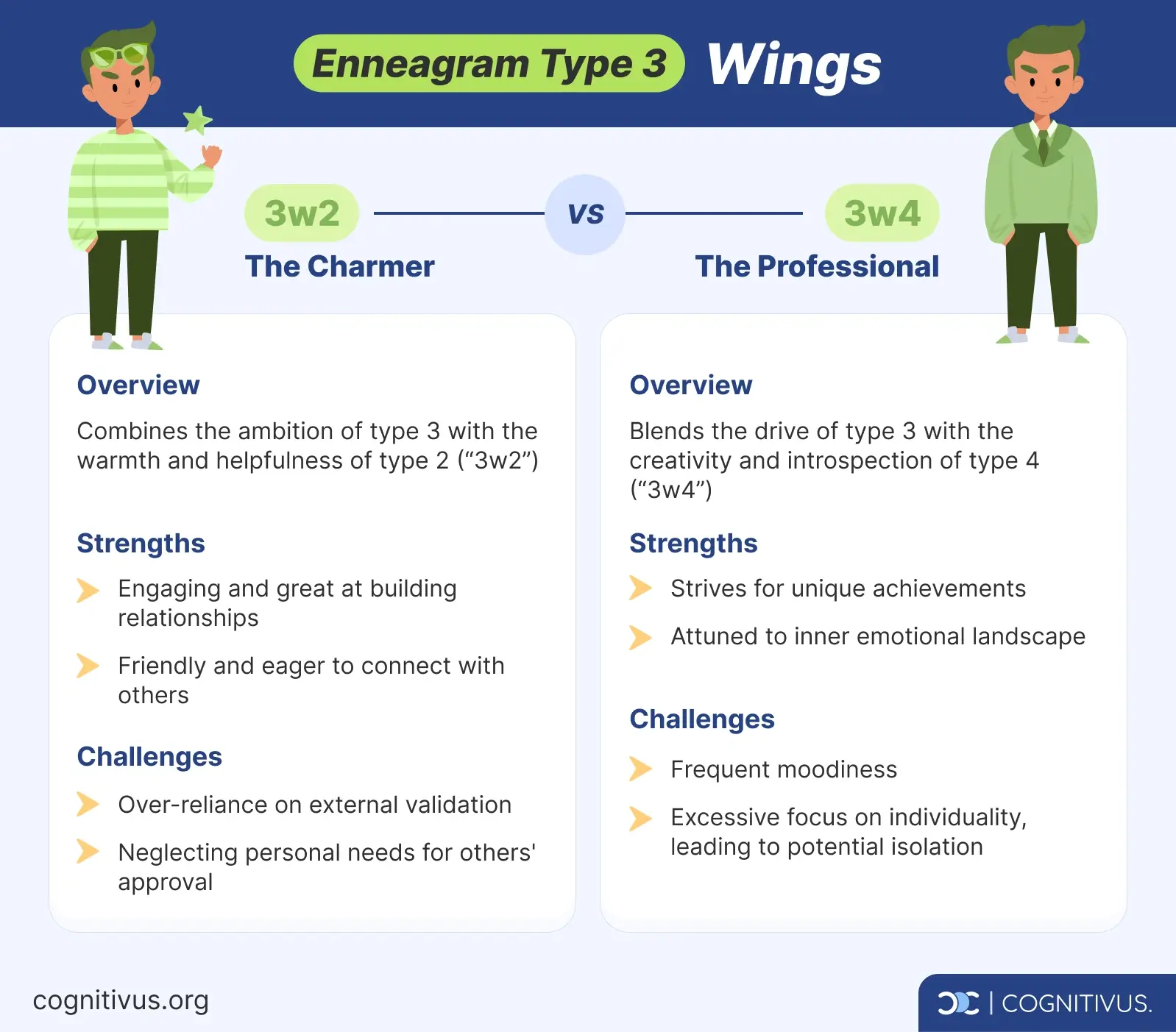
Enneagram type 3 wing 2
If you are a Type Three with a Two wing (3w2), you are known as "The Charmer." You blend the ambition and drive of a Type 3 with the warmth, helpfulness and interpersonal skills of a Type 2. This makes you incredibly engaging and eager to connect with others while pursuing your goals. You’re friendly and great at building relationships, but, you may also have an over-reliance on external validation. You may also neglect your personal needs in favour of gaining others' approval, which can leave you feeling a little depleted.
Enneagram type 3 wing 4
A Type Three with a Four wing (3w4) is called "The Professional." If this is your wing, you combine the drive and goal-orientated nature of Type 3 with the creativity and introspection of Type 4. This mix makes you strive for unique achievements and allows you to be more attuned to your inner emotional landscape, adding further depth to your pursuits. However, you should be mindful of frequent moodiness and an excessive focus on individuality, which can sometimes lead to feelings of isolation.
4. Enneagram Type 3 Subtypes Explained
In addition to wings, each Enneagram type has three subtypes: self-preservation, social, and sexual. These subtypes reflect different ways of coping with the world.
Self-preservation type 3 (3SP)
Self-Preservation Threes focus on security and independence. As a type 3, you seek success through self-reliance and practical achievements, driven by the need to create a stable and successful life, built on your own terms.
Social type 3 (3SO)
Social Threes seek success through their social image. If you identify as at typ3, you are highly aware of their status and work hard to be admired in social circles, thriving on recognition and approval from groups. You can be seen as a role model/leader and may be looked to for direction in group situations.
Sexual type 3 (3SX)
Sexual Threes pursue success through intense one-on-one connections. Being a type 3, you may strive to be attractive, impress those you care about, and be the best you can be, for yourself and others.
5. Healthy and Unhealthy Levels of Type 3
Enneagram Type Threes can exhibit varying levels of health, impacting how you express your core traits. There are 9 levels of health: healthy threes, average threes and unhealthy threes. We’ll go through each of them.
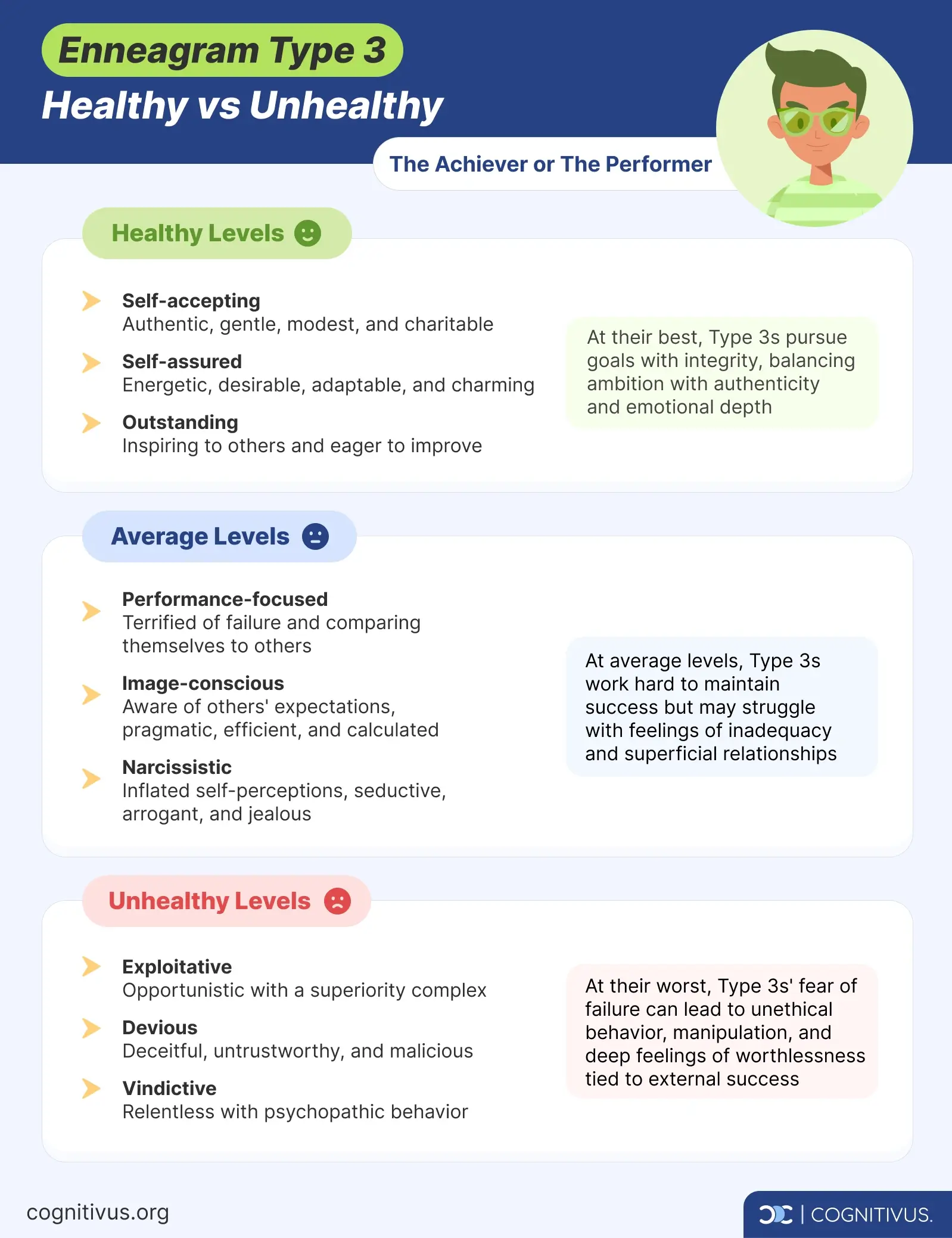
When you're at your best and healthiest level of type 3, you are:
- (1) Self-accepting, authentic, gentle, modest and charitable.
- (2) Self-assured, energetic, desirable, adaptable and charming.
- (3) Outstanding, inspiring to others and eager to improve.
You pursue your goals with integrity and are genuinely interested in helping others succeed. You balance your ambition with authenticity and emotional depth.
At average levels of type 3, you are:
- (4) Focused on their performance, terrified of failure, and comparing yourself to others.
- (5) Image-conscious, aware of others' expectations, pragmatic, efficient and calculated.
- (6) Narcissistic, have inflated personal notions, seductive, arrogant and jealous.
You work hard to maintain your success and may struggle with feelings of inadequacy if you don't meet your goals. Your relationships may be more superficial as you prioritise networking.
At unhealthy levels of type 3, you are:
- (7) Exploitative, opportunistic and have a superiority complex.
- (8) Devious, deceitful, untrustworthy and malicious.
- (9) Vindictive, relentless and show psychopathic behaviour.
Your fear of failure can lead to unethical behaviour and manipulation. You may completely tie their self-worth to external success and struggle with deep feelings of worthlessness when you don't meet expectations.
6. Enneagram Type 3 in Relationships and Work
Here’s how being an Enneagram Type 3 can affect your relationships at work, with friends and family and in love.
Type 3 at work
At the workplace, Type Threes really stand out and it’s no wonder that they are usually the highest earners.
If you are a three, your ambition, efficiency, and adaptability often allow you to take on strong leadership roles, thrive on clear goals and receive recognition for your efforts.
This drive, however, can sometimes lead to workaholic tendencies and burnout. In addition to this, you may also have a tough time with teamwork if you're too focused on your own personal achievements.
Type 3 in relationships with friends and family
With friends and family, 3s are supportive and encouraging, cheering everyone on and bringing positive energy to the scene and interactions.
Despite this, as a 3, you may struggle with vulnerability and emotional depth. Your focus on success can sometimes make you appear distant or preoccupied, so it is important for Threes to find a balance between your drive and maintaining genuine connections (which is crucial for healthy relationships).
Type 3 in romantic relationships
In romantic relationships as a type three, you are charming and attentive, always working hard to impress your partners and keep up a successful image.
However, similarly to relationships with friends and family, you may struggle with intimacy and vulnerability, fearing that your partner may reject you if you show your true selves.
If you want to improve your love relationship, it's important for you to build trust and open up emotionally to create deep, meaningful connections. You should remember that your worth is not solely based on achievements but also on who you are as a person.
7. How to Grow as a Type 3 Person
Growth for Type Threes involves balancing your drive for success with authenticity and emotional well-being.
Here are some tips to help 3s grow:
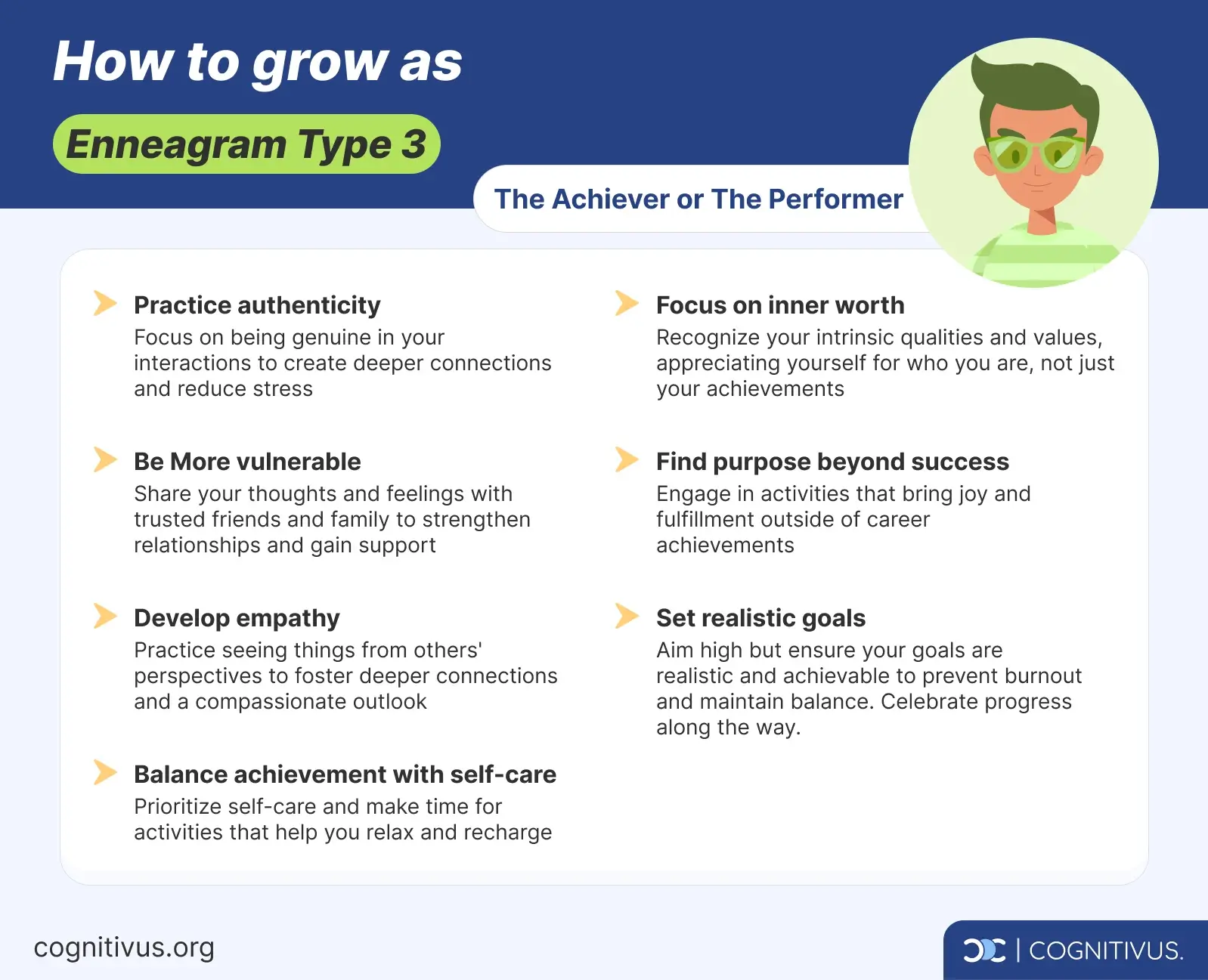
Practice authenticity
Try focusing on being genuine in your interactions. Let go of the constant need to always appear successful and allow yourself to be seen as you truly are- let people see the real you. By being more authentic, you can create deeper, more meaningful connections and reduce the stress of maintaining a façade.
Balance achievement with self-care
Whilst chasing your goals, do not forget to take care of yourself. Prioritize self-care and make an effort to make time for activities that can help you relax and recharge. Balancing your work with downtime is crucial for your well-being and achieving long-term success.
Be more vulnerable
Practice sharing your thoughts and feelings with trusted friends and family. Remember that allowing yourself to be vulnerable is okay, and it can actually strengthen your relationships and help you feel more supported. It's okay to show your imperfections and ask for help when needed, there is no shame in that. The more you work on vulnerability, the more natural it will feel and come to you.
Focus on inner worth
Recognise that your worth is not solely based on external achievements. Take the time to reflect on your intrinsic qualities and values, and learn to appreciate yourself for who you are, not just what you accomplish.
Develop empathy
Since a common challenge for Type Threes is prioritising themselves and their achievements, it can be easy to get caught up in yourself and your success, but try to see things from other people’s perspective too. Acknowledge your struggles and strengths. Practising this empathy can lead to deeper and more fulfilling connections, plus a more compassionate outlook.
Find purpose beyond success
Identify and pursue activities that bring you joy and fulfilment beyond your career and achievements. Whether it's a hobby, volunteering, or spending time with loved ones, these things can give you a greater sense of purpose and balance.
Set realistic goals
While it’s important to aim high, ensuring your goals are realistic and achievable can help you prevent burnout and maintain a healthy work-life balance. Celebrate your progress and accomplishments along the way.
8. Enneagram Type 3 Careers and Hobbies

Best jobs for type three
Type Threes excel in careers where they can set and achieve ambitious goals, thrive in roles that offer opportunities for advancement and can be recognised. Here are some ideal careers for Threes that you may consider:
- Entrepreneurs: Threes' drive and resourcefulness make you a natural at running your own business.
- Sales and Marketing: With your charisma and persuasion skills, you can really succeed in these fields.
- Public Relations: Threes excel in managing public perception and building a positive image.
- Executive Roles: Your leadership and efficiency make you perfect for high-level management positions.
Best hobbies and interests for type three
Threes benefit from hobbies that balance your work-oriented mindset with relaxation and creativity, so engaging in these activities can help you unwind and find joy outside of your career:
- Fitness and Sports: Physical activities help Threes stay energised and focused.
- Creative Arts: Try pursuing creative outlets like painting or music that can offer a break from structured routines.
- Travel: Exploring new places and cultures can provide both inspiration and relaxation.
- Volunteering: Helping others can offer fulfilment beyond professional achievements, as well as greater kindness.
9. Enneagram Type 3 Compatibility and Relationships
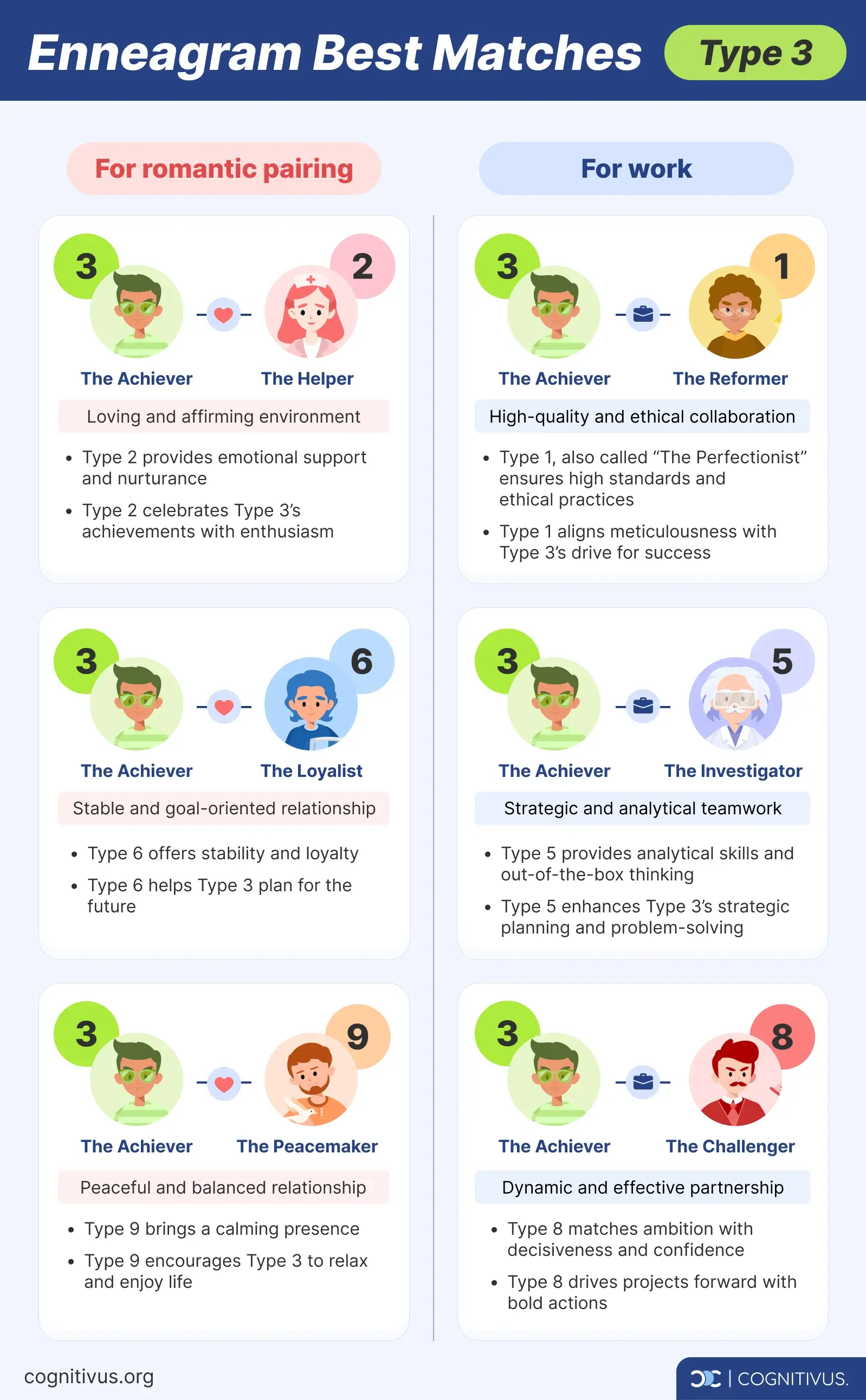
Best matches for romantic pairing
Type 3s are often attracted to partners who complement their drive and offer emotional support.
Some of the best matches for Threes include:
- Type 2 (The Helper): Twos' have a nurturing nature that balances your ambition. They provide the emotional support and connection you need, always offering encouragement and appreciation for your hard work. For instance, a Type 2 partner might celebrate your achievements with genuine enthusiasm, creating a loving and affirming home environment.
- Type 6 (The Loyalist): Sixes offer the stability and loyalty you need to feel grounded and secure. Their dependable nature can provide a solid foundation for your relationship, allowing you to chase your goals with confidence. A Type 6 partner is someone who can help you plan for the future and stand by you through thick and thin.
- Type 9 (The Peacemaker): Nines can bring a calming presence in your life, helping you to relax and appreciate life beyond your achievements. They bring a sense of peace and balance, reminding you to be mindful and live in the moment. With a Type 9 partner, you’ll find someone who encourages you to take breaks and engage in activities that bring joy and relaxation.
Best matches for work
In the workplace, Threes work well with types that complement their strengths and provide balance:
- Type 1 (The Reformer): Ones are meticulous and committed to integrity, which aligns well with your drive for success. They can help ensure that your ambitious projects are completed with high standards and ethical considerations. In a workplace setting, an Enneagram Type 1 colleague might help you to maintain quality control and ethical practices.
- Type 5 (The Investigator): Fives' bring their analytical skills and out of the box thinking that can support you in achieving your goals. They bring a depth of knowledge and a fresh, new perspective that can enhance your strategic planning and problem-solving abilities. A Type 5 team member will dig deep in research and data analysis to help support your initiatives.
- Type 8 (The Challenger): Eights' decisiveness and confidence match your ambition, creating a dynamic and effective partnership. They are strong leaders who can drive projects forward and take bold actions, complementing your goal-oriented nature. A Type 8 colleague might push you to take risks and pursue ambitious objectives, leading to greater success for your team.
Compatibility with all types
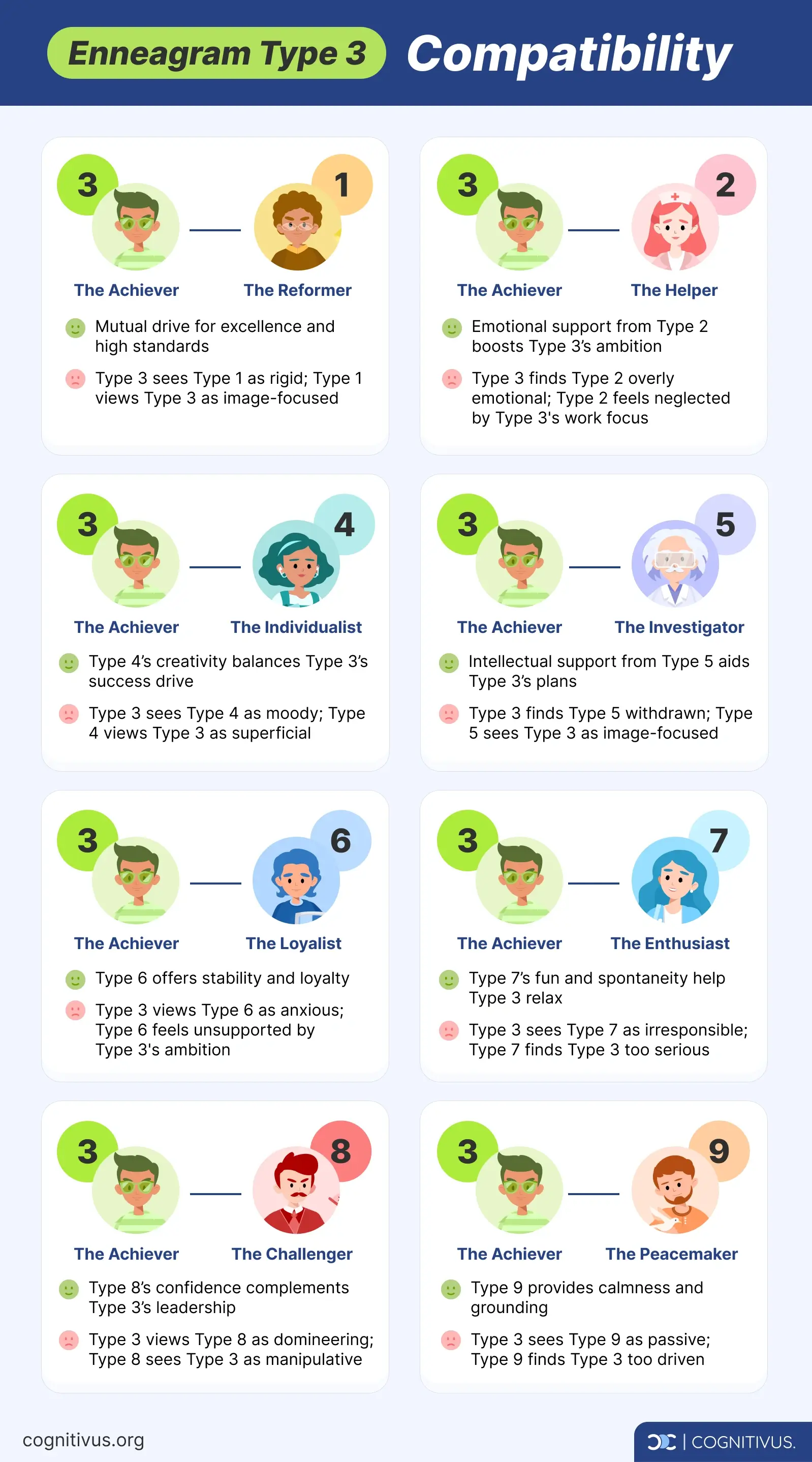
Type 3 vs Type 1 (The Reformer)
- Strengths: Both share a strong drive for excellence and high standards, admiring each other’s integrity and dedication to achieving their goals.
- Weaknesses: Type 3 might see Type 1 as too rigid and moralistic, while Type 1 could view Type 3 as too focused on image and success.
Type 3 vs Type 2 (The Helper)
- Strengths: Type 2 offers emotional support and encouragement, complementing Type 3’s ambitious nature. This makes Type 3 feel appreciated and valued.
- Weaknesses: Type 3 might see Type 2 as overly emotional, while Type 2 could feel neglected by Type 3's focus on work.
Type 3 vs Type 4 (The Individualist)
- Strengths: Type 4’s focus on creativity and authenticity balances Type 3’s pursuit of success, encouraging them to embrace their true selves amidst their drive to achieve.
- Weaknesses: Type 3 might see Type 4 as too moody and self-absorbed, while Type 4 could view Type 3 as superficial and inauthentic.
Type 3 vs Type 5 (The Investigator)
- Strengths: Type 5 provides intellectual stimulation and analytical support, helping Type 3 with strategic planning and achieving their ambitions.
- Weaknesses: Type 3 might find Type 5 too withdrawn and detached, while Type 5 could see Type 3 as overly concerned with image and status.
Type 3 vs Type 6 (The Loyalist)
- Strengths: Type 6 offers stability and loyalty, creating a secure and trustworthy foundation for Type 3’s relentless drive.
- Weaknesses: Type 3 might see Type 6 as overly anxious and hesitant, while Type 6 could feel unsupported by Type 3's single-minded ambition.
Type 3 vs Type 7 (The Enthusiast)
- Strengths: Type 7 brings fun and spontaneity, helping Type 3 to take breaks and enjoy life, balancing their intense work focus.
- Weaknesses: Type 3 might see Type 7 as too irresponsible and scattered, while Type 7 could find Type 3 too work-focused and serious.
Type 3 vs Type 8 (The Challenger)
- Strengths: Type 8’s strength and confidence complement Type 3’s leadership, fostering a dynamic partnership where both feel empowered to push boundaries and embrace challenges.
- Weaknesses: Type 3 might see Type 8 as too domineering, while Type 8 could view Type 3 as manipulative and overly focused on success.
Type 3 vs Type 9 (The Peacemaker)
- Strengths: Type 9 provides calmness and acceptance, offering a sense of relaxation and grounding for Type 3 amidst their high energy and stressful lifestyles.
- Weaknesses: Type 3 might see Type 9 as too passive and complacent, while Type 9 could find Type 3 too driven and stressful.
10. Famous Enneagram Type 3
Type 3 celebrities
Several celebrities well embody the traits of Type 3: they have achieved success in various fields and are known for their ambition and adaptability.

- Oprah Winfrey: Known for her success in media and philanthropy, Oprah is a prime example of Type Three, due to her commitment to achievement and influence.
- Tony Robbins: As a motivational speaker and author, Tony Robbins epitomises the ambition and adaptability of Type Threes, inspiring others to reach their full potential.
- Arnold Schwarzenegger: An actor, politician, and bodybuilder, Arnold’s diverse achievements highlight the Type Three drive for success and recognition.
- Beyoncé: A singer, actress, and entrepreneur, Beyoncé’s dedication to excellence and her ability to continually reinvent herself reflect the core values of Type Threes.
Other famous Type Three celebrities include Madonna, Michael Jordan, Sheryl Sandberg, Will Smith, and Bill Clinton.
Type 3 fictional characters
Fictional characters can also capture and embody the traits of Type 3. These characters are often seen striving for success and recognition.

- Harvey Specter (Suits): Known for his success and charisma, Harvey Specter embodies the Type Three drive for achievement and image-consciousness.
- Tony Stark (Iron Man): A brilliant and ambitious inventor, Tony Stark’s success and adaptability highlight the core traits of Type Threes.
- Leslie Knope (Parks and Recreation): Leslie’s dedication to her work and her ambition to improve her community reflect the Type Three commitment to success and influence.
Frequently Asked Questions (FAQ)
Is there a difference between achiever and performer?
Both refer to the same Enneagram Type 3, but there is a nuance. "Achiever" focuses on the drive for success, goal-setting, and ambition, highlighting Type Three’s relentless pursuit of excellence and recognition. Meanwhile, "Performer" brings more attention to the adaptability, image-consciousness, and social skills of Type Threes. It focuses on their ability to present themselves effectively and win admiration.
What MBTI type is Enneagram 3?
While there is no perfect match between the Enneagram system and the MBTI, Enneagram Type 3s often align with certain MBTI types. The most common ones for Type Threes are ENTJ, ENFJ, and ESTJ. These share Threes’ traits of ambition, efficiency, and leadership. ENTJs and ESTJs are known for their strategic thinking and organisational skills, while ENFJs mix together charisma and empathy, aligning well with the social adaptability of Type Threes.

